Filter by
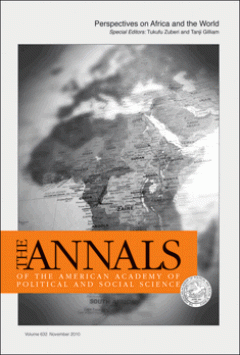
Decolonization or National Liberation: Debating the End of British Colonial R…
When discussing the end of British colonial rule in Africa, many historians have highlighted the role of postwar international relations and the impact of domestic imperial politics on decolonization and have failed to recognize the role of African nationalists. This article argues that such a viewpoint is flawed because it conceives of colonial policy makers as isolated and autonomous entities…
- Edition
- Vol. 632 no. 1, November 2010.pp. 41-54
- ISBN/ISSN
- 00027162
- Collation
- -
- Series Title
- The ANNALS of the American Academy of Political and Social Science
- Call Number
- -

Radical Islam in East Africa
Islam has a 1,000-year history in West Africa; in East Africa it is even longer. What started out as liberating efforts by Muslims in Africa degenerated into oppressive regimes over time. Over the centuries, conquest increasingly came to define Islam�s approach in Africa. How Africa manages its necessity to accommodate Islamic elements in its midst is one of the continent�s most daunting challe…
- Edition
- Vol. 632 no. 1, November 2010.pp. 55-66
- ISBN/ISSN
- 00027162
- Collation
- -
- Series Title
- The ANNALS of the American Academy of Political and Social Science
- Call Number
- -

Debating Darfur in the World
This article compares the debates and demonstrations about Darfur that have taken place in the Sudan, the United States, and Qatar and illuminates how political violence is apprehended and cultural identities are constructed. The rallies that occurred among Sudanese inside and outside the Sudan following the 2009 indictment of President Omar Hassan al-Bashir by the International Criminal Court …
- Edition
- Vol. 632 no. 1, November 2010.pp. 67-85
- ISBN/ISSN
- 00027162
- Collation
- -
- Series Title
- The ANNALS of the American Academy of Political and Social Science
- Call Number
- -

The United States of Africa: A Revisit
Pan-Africanism was developed over the late nineteenth and early twentieth centuries to combat the political subjugation of black people and the vestiges of slavery. Its founding belief is that black peoples share common cultures, problems, and objectives. It was, therefore, imperative for blacks to unite to achieve their objectives. On the African continent, Pan-Africanism became the rallying c…
- Edition
- Vol. 632 no. 1, November 2010.pp. 86-102
- ISBN/ISSN
- 00027162
- Collation
- -
- Series Title
- The ANNALS of the American Academy of Political and Social Science
- Call Number
- -

Afrocentricity and the Argument for Civic Commitment: Ideology and Citizenshi…
This article discusses an ideological framework, that is, a superstructure for continental civic commitment to African nationalism based on the perceived and practical relationships of Africans with each other. In an attempt to minimize the threats of regional, religious, or ethnic obstacles to continental integration and civic commitment to the continent, the author proposes both intellectual …
- Edition
- Vol. 632 no. 1, November 2010.pp. 121-131
- ISBN/ISSN
- 00027162
- Collation
- -
- Series Title
- The ANNALS of the American Academy of Political and Social Science
- Call Number
- -
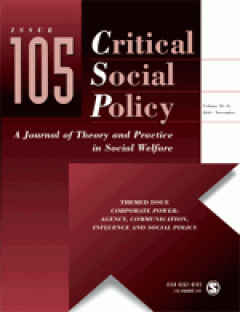
Introduction to the themed issue. Corporate power: Agency, communication, inf…
This paper introduces this themed issue of Critical Social Policy on the question of corporate power. Corporate power is recognized as an important agent in social policy making and delivery. However, to date there has been comparatively little attention to the crucial role that lobbying and corporate �spin� play in helping to shape policy making contexts. This special issue of Critical Social…
- Edition
- Vol. 30 no. 4, November 2010.pp. 459-471
- ISBN/ISSN
- 02610183
- Collation
- -
- Series Title
- Critical Social Policy
- Call Number
- -
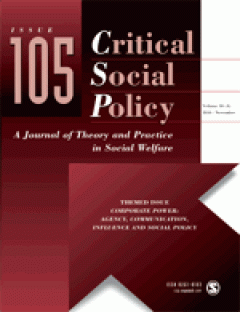
Capitalist globalization, corporate social responsibility and social policy
This article outlines how the twin crises of capitalist globalization � of class polarization and ecological unsustainability � combine to produce the need for Corporate Social Responsibility (CSR) to attempt to bridge the gap between the rhetoric and reality of corporate conduct. The first section outlines how CSR relates to capitalist globalization and how it is integrated into the activities…
- Edition
- Vol. 30 no. 4, November 2010.pp. 472-495
- ISBN/ISSN
- 02610183
- Collation
- -
- Series Title
- Critical Social Policy
- Call Number
- -

Business-managed democracy: The trade agenda
The architecture of global governance that has emerged in the past two decades has been strongly influenced by transnational policy actors. This article examines the role of transnational corporate agency in social policy by focusing in particular on the role of business coalitions, elite networking bodies and policy planning groups in fostering unity amongst corporate actors and enrolling poli…
- Edition
- Vol. 30 no. 4, November 2010.pp. 496-518
- ISBN/ISSN
- 02610183
- Collation
- -
- Series Title
- Critical Social Policy
- Call Number
- -

Corporate and political strategy in relation to the Private Finance Initiativ…
The Private Finance Initiative (PFI) allows corporations to access guaranteed flows of public funds in exchange for the use of new facilities and the provision of asset-based services such as maintenance and estates management. The policy has been developed in the UK since 1992 and has been applied in fields of social policy analysis: notably, health and education. PFI has been a difficult poli…
- Edition
- Vol. 30 no. 4, November 2010.pp. 519-540
- ISBN/ISSN
- 02610183
- Collation
- -
- Series Title
- Critical Social Policy
- Call Number
- -

Forging a ‘neoliberal pedagogy’: The ‘enterprising education’ agenda …
New Labour came to power with a stated commitment to �education, education, education� and confirmed quickly that this commitment included a greater role for business in the modernization of state schools. One important, yet under-researched, element of direct business involvement is in school pupils� personal and academic development evident in the increasingly pervasive embedding of rhetoric …
- Edition
- Vol. 30 no. 4, November 2010.pp. 541-563
- ISBN/ISSN
- 02610183
- Collation
- -
- Series Title
- Critical Social Policy
- Call Number
- -

Corporate strategy, corporate capture: Food and alcohol industry lobbying and…
This article examines two industry sectors � those making and selling fast food and alcoholic beverages or associated products. We examine their role in influencing policy and decision making on the regulation of their products for health reasons. We argue that the food and alcohol industries engage in a very wide range of tactics and strategies to defend and indeed to promote their �licence to…
- Edition
- Vol. 30 no. 4, November 2010.pp. 564-589
- ISBN/ISSN
- 02610183
- Collation
- -
- Series Title
- Critical Social Policy
- Call Number
- -
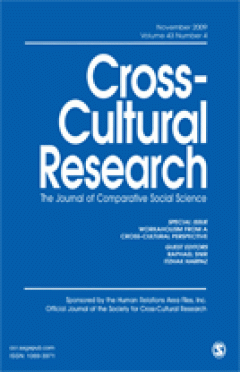
Winters, Summers, and Destructive Leadership Cultures in Rich Regions
Van de Vliert�s (2009) climato-economic theory of culture proposes that the impact of climatic demands on culture is influenced by wealth resources. In rich regions, much cold and heat in conjunction with relatively little wealth (undermatching) and little cold and heat in conjunction with relatively much wealth ( overmatching) both are thought to produce less destructive leadership cultures th…
- Edition
- Vol. 44 no. 4, November 2010.pp. 315-340
- ISBN/ISSN
- 10693971
- Collation
- -
- Series Title
- Cross-Cultural Research
- Call Number
- -

Assessing Cross-National Invariance of the Three-Component Model of Organizat…
This study examined cross-national invariance of Meyer and Allen�s three-component model of organizational commitment using samples of university faculty from six European countries. The analysis revealed strict factorial measurement invariance of affective, continuance, and normative organizational commitment constructs (AC, CC, and NC, respectively). While the samples failed to differ in AC a…
- Edition
- Vol. 44 no. 4, November 2010.pp. 341-373
- ISBN/ISSN
- 10693971
- Collation
- -
- Series Title
- Cross-Cultural Research
- Call Number
- -

Cross-Cultural Research on the Reliability and Validity of the Mayer-Salovey-…
Despite the rather large literature concerning emotional intelligence, the vast majority of studies concerning development and validation of emotional intelligence scales have been done in the Western countries. Hence, a major limitation in this literature is its decidedly Western focus. The aim of this research was to assess the psychometric properties of the Mayer-Salovey-Caruso Emotional Int…
- Edition
- Vol. 44 no. 4, November 2010.pp. 374-404
- ISBN/ISSN
- 10693971
- Collation
- -
- Series Title
- Cross-Cultural Research
- Call Number
- -

House Floor Area as a Correlate of Marital Residence Pattern: A Logistic Regr…
The goal of this article is to reflect on the relationship between average house floor area and marital residence pattern.This article brings three novel elements to this research problem: (a) it combines cases from the previous studies thus creating a larger empirical base, (b) logistic regression is used as an analytical technique which can test the significance and strength of the correlatio…
- Edition
- Vol. 44 no. 4, November 2010.pp. 405-424
- ISBN/ISSN
- 10693971
- Collation
- -
- Series Title
- Cross-Cultural Research
- Call Number
- -
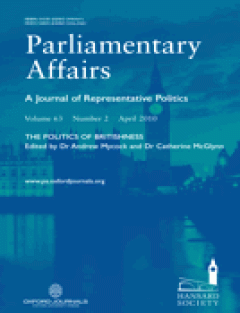
The Results: How Britain Voted
Between 2005 and 2010, despite some �random shocks� caused by the emergence of new party leaders, the trends in party support suggested a return to the traditional inter-election cycle. During the election campaign, however, there were dramatic changes as the popularity of Liberal Democrat leader, Nick Clegg, increased sharply. In terms of votes, the Conservatives emerged as the largest party b…
- Edition
- Vol. 63, No. 4, October 2010.pp. 588-606.
- ISBN/ISSN
- 00312290
- Collation
- -
- Series Title
- Parliamentary Affairs
- Call Number
- -

Five Days in May: A New Political Order Emerges
The 2010 general election result was so finely balanced that only a combination of the Conservatives and Liberal Democrats together could command a workable majority in the House of Commons. However, this combination meant that the Liberal Democrats had to abandon their centre-left positioning and, accepting the arithmetic conclusion of the election, help form a centre-right administration. Thi…
- Edition
- Vol. 63, No. 4, October 2010.pp. 607-622
- ISBN/ISSN
- 00312290
- Collation
- -
- Series Title
- Parliamentary Affairs
- Call Number
- -

So What Went Wrong with the Electoral System? The 2010 Election Result and th…
Single-member plurality is often thought to facilitate a two-party system of alternating single-party majority government. However, no party secured an overall majority in the 2010 UK election, which was followed by the formation of the first peacetime coalition government since the 1930s. This article assesses whether this outcome was a one-off occurrence or was symptomatic of longer term chan…
- Edition
- Vol. 63, No. 4, October 2010.pp. 623-638
- ISBN/ISSN
- 00312290
- Collation
- -
- Series Title
- Parliamentary Affairs
- Call Number
- -

New Labour and Political Change
Labour won three general elections and governed for 13 years between 1997 and 2010, the longest period of government in its history. How far Labour succeeded in changing British politics permanently in this period has been much debated. Different approaches to this question are considered, as well as different contexts that are useful in forming an assessment. The impact of new Labour on electo…
- Edition
- Vol. 63, No. 4, October 2010.pp. 639-652
- ISBN/ISSN
- 00312290
- Collation
- -
- Series Title
- Parliamentary Affairs
- Call Number
- -

Labour's Campaign: Things Can Only Get Worse?
Labour's failure to secure re-election hardly came as a surprise given its performance in government and at the polls since 2005. It was moreover the third election a row that the party had lost votes from across the social spectrum. However, despite a flawed leader and a difficult economic context, the party nearly secured enough seats to provide the basis for a coalition with the Liberal Demo…
- Edition
- Vol. 63 No.4, October 2010.pp. 653-666
- ISBN/ISSN
- 00312290
- Collation
- -
- Series Title
- Parliamentary Affairs
- Call Number
- -
 Computer Science, Information & General Works
Computer Science, Information & General Works  Philosophy & Psychology
Philosophy & Psychology  Religion
Religion  Social Sciences
Social Sciences  Language
Language  Pure Science
Pure Science  Applied Sciences
Applied Sciences  Art & Recreation
Art & Recreation  Literature
Literature  History & Geography
History & Geography